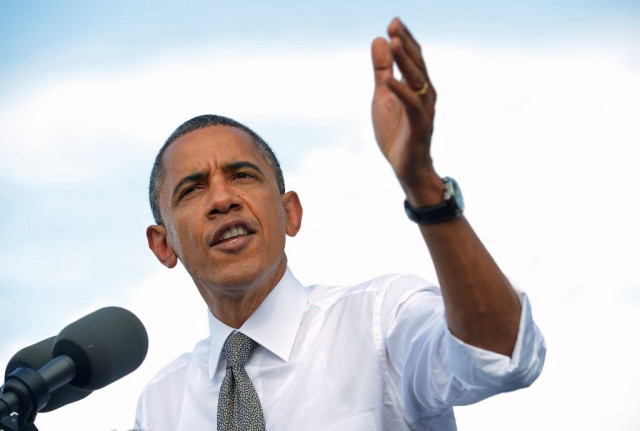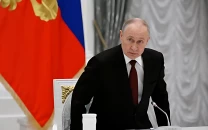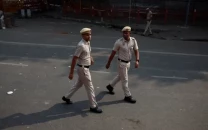Arabs grudgingly favour Obama in US election
Obama’s 2009 Cairo speech had raised hopes of change.

Arabs grudgingly favour Obama in US election
Whoever wins the November 6 election faces a knot of regional issues that will not be easy to unravel. World powers are split over the Syria conflict, a row about Iran's nuclear ambitions rumbles on and Palestinian-Israeli peacemaking is going nowhere.
Compounding the challenge, the Middle East is a region where perceptions of fading US influence have been hardened by Arab uprisings that have toppled dictators who were longtime US allies.
"I am one of those who is very much disappointed with Obama," said Hassan Nafaa, a professor at Cairo University, where the US president, in his first months in office, spoke of "a new beginning" between America and Muslims.
"He didn't deliver ... But I think he is much better than Romney," said Nafaa, who listened to the Cairo speech in June 2009. "I don't appreciate at all the right wing in the United States with their preference to use extensive military force."
Much of the Middle East has changed dramatically during Obama's first term. But the upheavals of the "Arab Spring" that ousted entrenched autocrats in Tunisia, Egypt, Yemen and Libya were driven by the street rather than US policy, even if US and European warplanes assisted Libyan rebels.
Far from winning praise, some Egyptian activists criticised Obama's administration for being slow to embrace the change.
"Obama was easy on Mubarak at points and the American administration did not play a full role in supporting the Egyptian revolution," said Mohamed Adel, a spokesman for the April 6 movement that was at the forefront of the 2011 uprising that toppled Hosni Mubarak after 30 years in power.
But he said Romney was not an attractive alternative for Egypt or the region, describing him as more "aggressive" and citing the Republican's threats to US aid to Egypt during September protests at the US embassy over an anti-Islam film.
Drawing comparisons
Romney has accused Obama of being a weak steward of US power, promising among other things to boost the US naval presence in the Middle East. He has also said he would be a better friend of Israel, a nation Obama has not visited in office.
That kind of language rings alarm bells in the region and has drawn comparisons with the policies of President George W Bush, reviled by many Arabs for leading an invasion of Iraq.
As Arabs watched the last of three televised presidential debates on Monday night, one viewer, Ahmed Zaki, wrote about Romney on Twitter saying: "He doesn't differ much from Bush."
But both candidates disappointed veteran Palestinian negotiator Hanan Ashrawi during the face-off on foreign policy in which Israel was referred to more than 30 times and the Palestinians were given only passing mention.
"What we didn't see in the debate was any sign of who has the backbone and foresight to bring about a just peace," said Ashrawi, adding that the candidates were competing on "who's more loyal to Israel".
Romney angered Palestinians earlier this year by suggesting they lacked the culture that has driven Israel's economic success, while ignoring problems generated by Israeli occupation of territories where they Palestinians seek statehood.
He also called Jerusalem Israel's capital. The Jewish state regards all of Jerusalem, including the eastern sector that it captured in a 1967 Middle East war, as its capital, a claim that has not won international recognition. Palestinians want East Jerusalem as the capital of a future state.
Yet there is little enthusiasm in the region for Obama, who in his Cairo address had pledged support for a Palestinian state that now looks as much a distant prospect as at any time.
For some, like 45-year-old Iraqi shop worker Firas al-Qaisi, neither candidate will make a real difference.
"Look at the Palestinian issue, there is no change in the American policy since 1948 although many presidents came and went," he said in Baghdad.
Yet Iraq is one place where Obama has had an impact by withdrawing US troops, although Romney has accused the president of being too hasty.
Little choice
That achievement was acknowledged by Alaa al-Saadoun, an Iraqi Kurdish lawmaker. "The work Obama did withdrawing American forces from Iraq made a difference. If the Republicans were in power, they would not have left," he said.
But even as that military intervention was ended, Obama has ordered US drones to kill militants in Yemen and Pakistan, enraging many in the region. Romney has backed this action.
Such policy convergence makes some Iranians, whose economy is being crippled by US and other international sanctions imposed over Tehran's disputed nuclear programme, feel there is little to choose between either candidate.
"Obama has already showed he wants to wreck the Iranian economy, bring hard times and prevent important medicine by sanctioning the central bank so there is not a lot Romney could do that Obama hasn't done already," said Mohammad Marandi of Tehran University, speaking by telephone from Tehran.
A commentary published by the Iranian news agency Fars echoed that view: "Will it be more of the fist inside the velvet glove, or the hammer directly to the skull?"
As sanctions tighten on Iran, the conflict in Iran's ally Syria has deepened with the United States and its Western allies at odds with Russia and China about what action to take, though no world power has been advocating direct military intervention.
Romney said earlier this month he would find elements in Syria who shared US values and make sure they obtained weapons needed to defeat Syrian President Bashar al-Assad. Obama's administration says it is giving logistical support to Syrian insurgents but has shied away from providing arms.
The international gridlock over Syria and uprisings that have breathed new vigour into Arab politics may also be changing attitudes about the United States, for years seen as the only player with the clout to make a difference in the region.
"There is sense that the US isn't as relevant as it once was," said Shadi Hamid of the Brookings Doha Center. "But that is also partly because the Arab Spring helped empower Arabs to move away from their obsessive focus on the US."
His remarks were echoed by 70-year-old Egyptian security guard, Gamal: "I don't expect any change from the Americans towards us. We have to change ourselves with our own hands."



















COMMENTS
Comments are moderated and generally will be posted if they are on-topic and not abusive.
For more information, please see our Comments FAQ